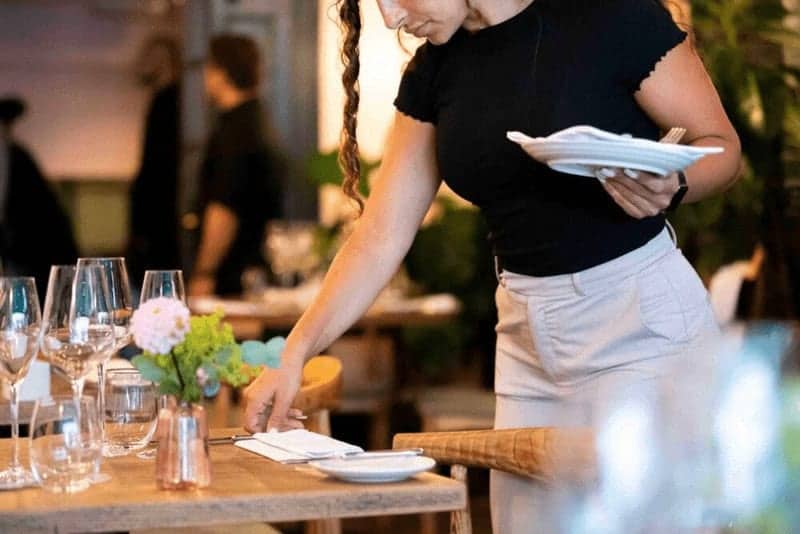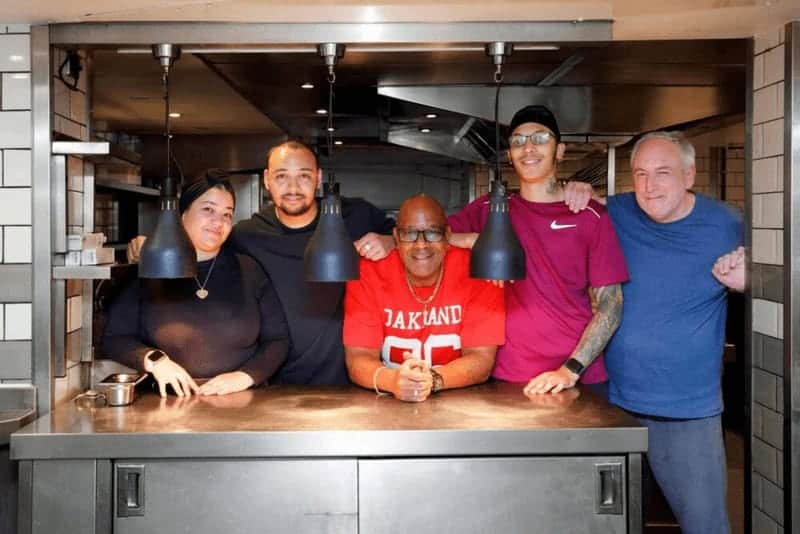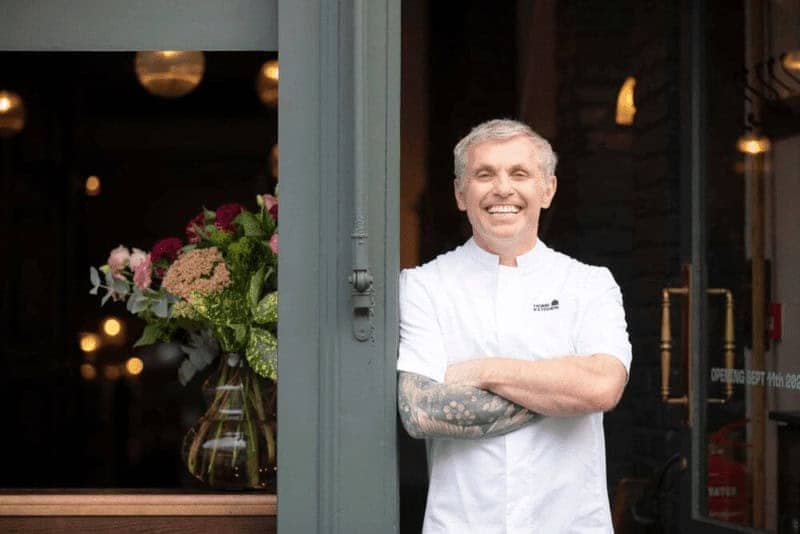It’s 4pm on a Friday, and the staff at Home Kitchen, north London’s buzziest new restaurant, are prepping for another busy evening’s service. Front of house workers are scuttling around polishing silverware and, in the kitchens downstairs, ingredients are being sliced and diced for a busy night ahead. The air is thick with the scent of sizzling meat and punctuated by the clinking of cutlery and the chatter of reservations being taken over the phone.
Watching the glowing tableau, you’d assume Home Kitchen to be a fine dining establishment like any other. Once the home of long-standing institution Odette’s, the Primrose Hill eatery certainly has the plush interiors and expertly curated seasonal menu to compete with London’s best.
But there’s more to Home Kitchen than meets the eye – or tickles the taste buds. Not only is the restaurant run not-for-profit, but nearly all of the staff members have experienced homelessness: a first of its kind in the fine-dining industry. It’s the project of two-time Michelin-starred chef Adam Simmonds and Soup Kitchen London director Adam Brown. The pair partnered with homelessness charity Crisis and social enterprise Beam to fill eight kitchen and eight front of house roles, when they opened their restaurant in autumn 2024.
Solutions every Saturday
Uplift your inbox with our weekly newsletter. Positive News editors select the week’s top stories of progress, bringing you the essential briefing about what’s going right.
Sign up
Funded by a £500,000 crowdfunding drive and social investment loans, Home Kitchen provides staff with a comprehensive package that’s designed to help them avoid returning to homelessness. The 16 staffers are employed on full-time contracts, paid at London Living Wage, have their travel cards covered for zones one and two, and receive catering qualifications in addition to in-house training.
Those heading up Home Kitchen make it clear that they don’t require their staff to talk to journalists like me. Those who choose to, however, have moving stories to share. Popping out of the kitchen to speak to me is French-Algerian chef Mimi, who moved to the UK when she was eight and who is now Home Kitchen’s pastry chef. She’s the first to admit that she was sceptical when her Jobcentre worker told her about the position. “I was like: ‘They’re not gonna accept me, I don’t have experience,’” she remembers. It seemed too good to be true.
Mimi did have experience: just not in the world of croissant lamination and ornate lemon tarts. Back home in Algeria, her mum made the wedding cakes for her community, and Mimi watched her imbue every bake with love and care. Unfortunately, life seemed designed to bat Mimi down. Her voice drops to an almost-whisper as she describes how she left her family home after struggling with depression and stress. She found herself becoming one of London’s forgotten homeless, a population that was recently estimated to have reached 183,000 people.


In the end, a friend took Mimi in, and she met and married her husband, whose family she now lives with. But the care work she was picking up sporadically dried out when Covid hit. When the Home Kitchen offer came, Mimi just “didn’t believe it” she remembers. “Since then, I just fell in love with the place. We’re like a little family here … I really enjoy waking up in the morning, knowing that I’m coming to work: I’m going to see my second family.”
Mimi was trained in the intricacies of her “technically focused” pastry chef role over three weeks, led by head chef Toby Lever. The front of house staff, meanwhile, were taught by restaurateur Zak Jones, who runs the Primrose Hill joint. The main challenge for the eight waiting staff has simply been getting to grips with fine-dining service. “There’s a lot to learn – it takes even trained people a long time to get used to that,” Jones explains.
For kitchen porter Genet, Home Kitchen marked her first job in London. When she and her husband moved to the UK from Eritrea, they went straight into Crisis’s care, spending eight months in a hostel before being given housing association accommodation. English isn’t Genet’s first language, and she tells me her initial job searches had been fruitless. “We don’t have home before, me and my husband [were] homeless,” she says. “I will try, but still, I cannot find any job. But Crisis, I will ask. I say: ‘Any job.’”
Some guests will walk in and won’t have any idea about the background, or about what we do, and then when we tell the story, they’re even more surprised
When the Home Kitchen offer came up, Genet wanted them to know that she wouldn’t be perfect. “We have to understand each other,” she says. “If someone, maybe he make mistake, we have to listen each other. Maybe, if I not understand, we help each other.” Her face breaks into a grin. “We are friendly.”
In place of kitchen experience, it was “a bit of initiative, a spark, a passion” that Jones and his team were seeking in prospective employees. Social impact eateries are by no means a new phenomenon, from coffee shops (Redemption Roasters, Fair Shot cafe) to bakeries (Luminary Bakery, The Dusty Knuckle), but Home Kitchen is the first to bring it to the elite restaurant world. On the à la carte menu (there is also a prix fixe option), you’ll find scallop ceviche embellished with mustard frills, guinea fowl alongside confit cabbage and monkfish paired with Jerusalem artichoke.
So far, the reviews have been raves, and Jones hopes the restaurant will continue to be a success as both a charitable project and gold-standard food experience. “We’re aiming for accolades – the ideal one would be a Michelin star,” he explains, confidently.
At a time when people in the UK are eating out less and less, Home Kitchen has been an anomaly so far, with the house nearly full every night. Tonight, they’re even opening 30 minutes early for a 12-person party, which is dropping by before the theatre. Jones says: “Some guests will walk in and won’t have any idea about the background, or about what we do, and then when we tell the story, they’re even more surprised.”



There are already plans to expand the business, opening Home Kitchens in Brighton and even San Francisco. But it’s clear that investment will continue in the Primrose Hill restaurant, with internal promotions already planned for those staff members who have particularly excelled. To ensure this can happen, Jones says, they need their seats to continue to be filled and for customers to spend generously. “We can’t rest on our laurels and expect money to keep coming in. We have to keep working – keep pushing,” he says.
That same attitude is felt behind the scenes, too: after all, that fast-paced kitchen environment can take some adjusting to. “You can’t stand or stop,” Mimi tells me. Jones adds that, for people who have been out of work for a prolonged period, it can be a “difficult” adjustment. But for the most part, things have gone incredibly smoothly.
Sure, certain tasks might take longer than they would with career restaurant staff, but Jones has revelled in watching the staff members grow from the “meek, mild, a little bit nervous” people they first interviewed, into the confident, calm, hard workers they now see. Both Genet and Mimi dream of opening their own places one day: such a goal wouldn’t have been fathomable when they started out.
Fewer than three months since Home Kitchen opened, the employee support offered by Crisis and Beam is ongoing, while the Home Kitchen team leaders take it upon themselves to check in with staff every day.
“[There’s] a lot of support, a lot mentally. If someone’s upset, straight away they’ll take them to a corner and be like: ‘Talk to me, what’s happening?’ It’s really, really, really nice,” Mimi says. At the end of daily service, the team sit down and break bread (literally) with a communal meal. “It’s a brilliant team. Everybody supports everybody,” adds Jones, with a smile. “When service starts, we’re all equal.”
Be part of the solution
Positive News is helping more people than ever to get a balanced and uplifting view of the world. While doom and gloom dominates other news outlets, our solutions journalism exists to support your wellbeing and empower you to make a difference towards a better future.
But our reporting has a cost and, as an independent, not-for-profit media organisation, we rely on the financial backing of our readers. If you value what we do and can afford to, please get behind our team with a regular or one-off contribution.
Give once from just £1, or join 1,500+ others who contribute an average of £3 or more per month. You’ll be directly funding the production and sharing of our stories – helping our solutions journalism to benefit many more people.
Join our community today, and together, we’ll change the news for good.
This article was originally published on Positive.news and was republished here, with permission, under a CC BY-ND 4.0 license. Learn more about third-party content on ZanyProgressive.com.




